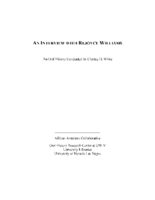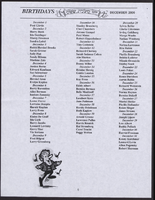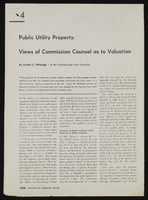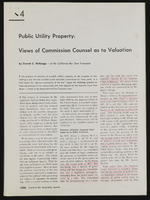Search the Special Collections and Archives Portal
Search Results

Transcript from interview with Rejoyce Williams by Claytee White, June 12, 1996
Date
Archival Collection
Description
Rejoyce Williams moved to Las Vegas with her husband and their six children in 1960. Williams grew up in Fordyce, Arkansas, and has also lived in California. When she arrived in Las Vegas, she worked as a maid at the Las Vegas Hilton and participated in the Culinary Union strike in 1970. In the interview, she discusses her involvement in church activities, and other anecdotes from her employment.
Text
Melvin Sanders Jr. oral history interview
Identifier
Abstract
Oral history interview with Melvin Sanders Jr. conducted by John Grygo on February 18, 2013 for the African Americans in Las Vegas: a Collaborative Oral History Project. In this interview, Sanders discusses his personal history and his experiences growing up in Las Vegas, Nevada. He describes the development of West Las Vegas, his father being a pastor at the House of Holiness church, and talks about other spiritual leaders in the community. Later, Sanders discusses the riots after the assassination of Martin Luther King Jr. and how African American entertainers were limited in where they performed on the Las Vegas Strip. He talks about Jackson Street, the increase of police on the Westside, and racial tensions in the mid 1970s. Lastly, Sanders recalls when casinos begun integrating, and he describes starting an automobile detailing business, J.R. Detailing.
Archival Collection
Jesma and Carlyle Wilcox oral history interview
Identifier
Abstract
Oral history interview with Jesma and Carlyle Wilcox conducted by Sally Griffis on February 19, 1976 for the Ralph Roske Oral History Project on Early Las Vegas. Jesma Wilcox begins by describing her family ranch, how her father leased the property to tenants, and what it was like living without air conditioning and refrigeration. She describes using a nearby stream as a water source, recreational activities, and the Mormon settlers and missionaries who first settled on the ranch. Wilcox talks about her religious involvement with the Mormon Church and life in Las Vegas, Nevada during the mid-twentieth century, as well as how Las Vegas has changed. Wilcox, with her husband Carlyle, also discusses the history of the nuclear weapons tests. Carlyle then describes the construction of the Basic Magnesium Plant in Henderson, Nevada.
Archival Collection
George Goto oral history interview
Identifier
Abstract
Oral history interview with Toshiyuki “George” Goto conducted by Christina Oda on February 26, 1979 for the Ralph Roske Oral History Project on Early Las Vegas. Goto first talks about his move to Nevada in 1951 before talking about his family, church activities, politics, and recreational activities. He then discusses the building, economic, and environmental changes in Las Vegas, Nevada. Goto later talks about his profession in landscaping, including the work he completed for some of the hotels and resorts built on the Las Vegas Strip. The latter part of the interview includes discussion about Goto’s Japanese ancestry and his perceptions as a minority when first moving to and living in Las Vegas.
Archival Collection
Carrie McCoy oral history interview
Identifier
Abstract
Oral history interview with Carrie McCoy conducted by Claytee D. White in Fordyce, Arkansas, approximately 1995 for the African Americans in Las Vegas: a Collaborative Oral History Project. In this interview, McCoy explains how she and her husband left Fordyce for Las Vegas, Nevada in 1942, seeking better economic prospects. After several years, McCoy returned to Fordyce to raise their four children and work as a housekeeper for several white families. After her oldest children were grown she returned to Las Vegas in 1961, first finding work at a small motel and then spending nine years working in housekeeping at the Flamingo Hilton Hotel. Finally, she returned to Fordyce in 1972. She ends the interview talking about comparative race relations between Fordyce and Las Vegas, differences in work practices, union activities, and church involvement.
Archival Collection
James, Tony, and Frederick Smith oral history interview
Identifier
Abstract
Oral history interview with James, Tony, and Frederick Smith conducted by Claytee D. White on February 25, 2014 for the African Americans in Las Vegas: a Collaborative Oral History Project. In this interview, James discusses his family background, military career, and marriage, and the sons add details about their mother's career at the Tropicana Hotel and Casino. All three talk about the role of churches in the Westside, Las Vegas, Nevada, and James recalls what the Westside was like in the 1960s and 1970s. He mentions a midnight curfew on the Strip for black residents, entertainment and business venues in the Westside, the role of the Culinary Union in black residents' economic opportunities, and the response of casino-hotel management to federal legislation designed to combat racism. The sons then discuss their educations and careers, about gang activities in Las Vegas, and changes in economic opportunities for young people.
Archival Collection
Ella Earl Carruth Photograph Collection
Identifier
Abstract
The Ella Earl Carruth Photograph Collection contains photographs depicting Mormon settlers in Nevada from 1906 to 1934. The materials include photographs of the Mormon Fort in present-day Las Vegas, Nevada, the town of Bunkerville, Nevada, and Mormon pioneers Edward Bunker, Joseph Ira Earl, and Zilpha Earl.
Archival Collection



